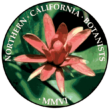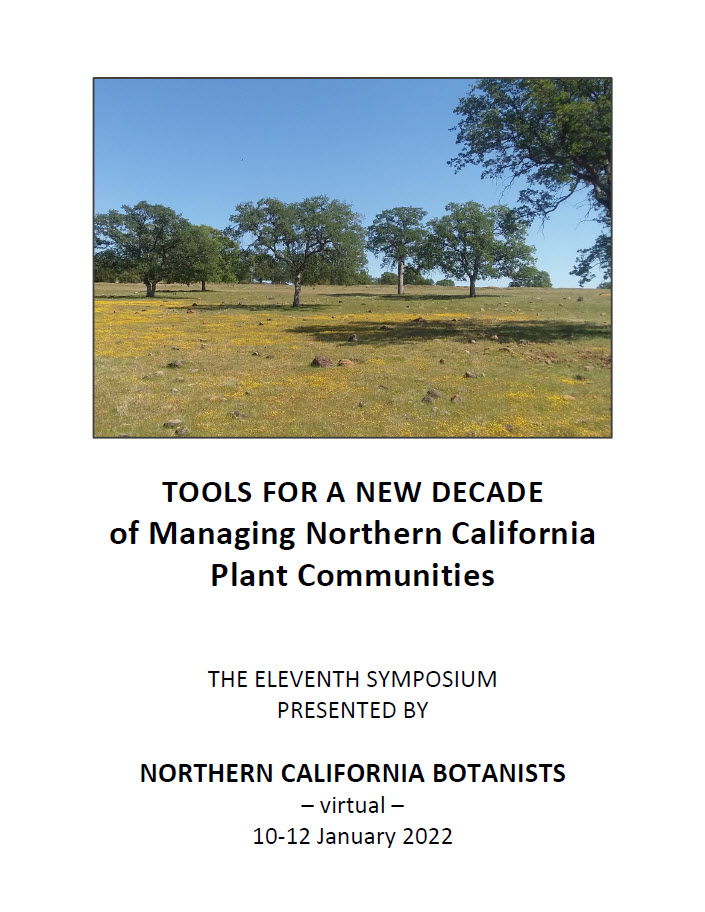Tools for a New Decade of Managing Northern California Plant Communities
Northern California Botanists hosted its 11th botanical symposium as a virtual event on January 10-11, 2022, with optional workshops on January 12. Session talks were prerecorded with a live question and answer period with the speakers following each session. Sessions included:
- The Power of Pollinators: Habitat, Conservation, and Plant Interactions; Traditional Ecological Knowledge and Ethnobotany
- Great Basin Restoration Approaches
- New Discoveries; Riparian Vegetation Restoration from Theory to Practice; eDNA
- Now the Good News; Lightning Talks; and a Poster Session.
Our Keynote Address by Dr. Frank Kanawha Lake was titled “Indigenous Knowledge and Ethnobotany: Tribal Understandings and Connection of Plants and the Environment.”
Workshops held on January 12, 2022, included:
- Workshop 1: Features of the Consortium of California’s CCH2 Data Portal. Instructor: Katie Pearson, Project manager, California Phenology Network
- Workshop 2: Tracking Plant Population Change using Calflora. Instructor: Cynthia Powell, Executive Director of Calflora
Congratulations to our Student Poster Winners!
- First Place – Matthew Mayer, California State University, Chico
- Second Place – Kelli Thorup, California State University, Chico
- Third Place – Laura Lampe, California State University, Chico
Symposium Presentations
Session 1: The Power of Pollinators: Habitat, Conservation, and Plant Interactions. Session Chair: Russell Huddleston, Environmental Protection Agency, Region 9
- Creating High Quality Habitat Dominated by Native Herbaceous Vegetation in the Built Environment. Pat Reynolds, River Partners
- Monitoring Butterfly Populations in the Sierra-Cascade Foothills as Part of a Conservation Initiative. Don Miller, California State University, Chico
- Floral Signals and Pollen Placement: Revisiting the Natural History of a Beloved Sierra Nevada Wildflower System. Devon Picklum. University of Nevada, Reno
- Pollination Extends to Frugivory in the Pallid Bat, Antrozous pallidus. Jaclyn Alperti, NatureServe
Session 2: Traditional Ecological Knowledge and Ethnobotany. Session Chair: Kerry Byrne, Humboldt State University
- “Yes, It Often Doesn’t Have a Happy Ending:” California Indian Oral Traditions and Environmental Science. Sherrie Smith-Ferri, Grace Hudson Museum
- Yurok Tribe Food Sovereignty: Combining Traditional Food Systems, Gardens, and Orchards to Decolonize Diets. Taylor Thompson, Yurok Tribe Environmental Program
- Indigenous and Indigenous-Informed Burning for Habitat Enhancement and Stewardship. Don Hankins, California State University, Chico
- TEK for Climate Change Adaptation. Ali Meders-Knight, Chico Traditional Ecological Stewardship Program, Chico, CA
Keynote Address: Tribal Cultural Relationships with Plants – From Mountains to the Sea. Frank Lake, U.S. Forest Service, Pacific Southwest Research Station
Session 4: Great Basin Restoration Approaches. Session Chair: Allison Nunes, Humboldt State University
- Restoration Plant Material Development in the Great Basin Region of the United States: A History and Comparison of Research Approaches. Francis Kilkenny, U.S. Forest Service, Rocky Mountain Research Station
- Conservation Implications of the Discovery of New Locations of a Threatened Species using Iterative Ensemble Niche Modeling. Israel Borokini. University of California, Berkeley, Department of Integrative Biology
- Interagency Seed Collection Efforts in the Great Basin Ecoregion. Jess Kindred, Great Basin Plant Conservation and Restoration Program
- Community Approach to High Desert Restoration: A History of Co-Occurrence Does Not Predict Response to Invasion. Alison C. Agneray, University of Nevada, Reno
Session 5: New Discoveries. Session Chair: Jane Van Susteren, California Department of Forestry
- Lineage and Species Discovery in the Remarkably Diverse Tribe Eriogoneae – Eriogonum and Relatives. J. Travis Columbus, California Botanic Garden
- Lomatium macrocarpum s.l., a Plant with a Wide Range and Many Names. Kevin Mason, Carex Working Group
- New Concepts for What is Erythranthe guttata and What is Not. Steve Schoenig, California Department of Fish and Wildlife, retired
- Steps toward Understanding Western Bellflowers. Nancy Morin, Flora of North America
Session 6: Riparian Vegetation Restoration from Theory to Practice. Session Chair: Rob Thoms, Stillwater Sciences
- River Restoration 2.0: A Broader Palette of Options and the Return of the Floodplain. Pete Downs, University of Portsmouth and University of California, Santa Barbara
- Water Stress in Riparian Woodlands from Groundwater Decline and Climate Change – Ecosystem Indicators at Multiple Scales. John Stella, SUNY
- Case Studies of In-stream Restoration and Riparian Revegetation in the Salmon River Watershed. Deja Malone-Persha, Salmon River Restoration Council
- Does Hydrologic Restoration of Mountain Meadows Result in a Net Increase in Carbon Storage? Amy Merrill, American Rivers
Session 7: eDNA. Session Chair: Rachel Meyer, University of California, Santa Cruz
- CALeDNA Teams Search for Patterns in Plant, Microbe, and Animal DNA Presence in Vernal Pools, Oases, Rivers, Mountains, and Coasts. Rachel Meyer, University of California, Santa Cruz and Jason Sexton, University of California, Merced
- Fungal Metabarcoding to Illuminate Plant-Fungal Networks in Complex Plant Communities. Gregory Gilbert, University of California, Santa Cruz
- Coastal Dune Restoration Efforts Complicated by Changes in Soil Biota and Chemistry Associated with Establishment by Non-Native Invader. Lorraine Parsons, Point Reyes National Seashore, National Park Service
- Zeta Diversity Patterns in Metabarcoded Lotic Algal Communities as a Tool for Bioassessment. Ariel Levi Simons, University of California, Los Angeles
Session 8: Lightning Talks. Session Chair: Kristen Kaczynski, California State University, Chico
- New county record collections in the Northern and Central Sierras. Shane Hanofee, Kleinfelder
- Is Phytophthora ramorum a threat to California chaparral? Wolfgang Schweigkofler, Dominican University of California
- Slowed obligate seeder recovery post-fire in dozer lines. Hannah Weinberger, Ascent Environmental
- Invasive spongeplant found in Feather River. Robin Carter, California Department of Water Resources
- Creating Habitat: A State-wide experiment for the Western Monarch (Danaus plexippus). Kim Armstrong, River Partners
- A Botanist’s Perspective Working on Burned Area Emergency Response (BAER) Teams in Northern California. Lusetta Sims, Shasta Trinity National Forest
- The Importance and Establishment of Research Natural Areas Within the National Forest System. Lauren Quon, Cleveland National Forest
- The California Certified Botanist. David Magney, California Native Plant Society
- Long-term recovery of restored Sacramento River floodplains. Brook Constantz, University of California, Santa Cruz
- Learn to Love those Latin Names: A straightforward new book on how to use scientific names. Ann Willyard, Hendrix College, retired
- Post-fire monitoring of vegetation in Santa Cruz and Santa Clara counties: opportunities for collaboration and next steps in 2022. Kelsey Guest, California Native Plant Society
- Management and ecological surveys indicate long-term grassland restoration success but potential for biotic homogenization. Justin Luong, University of California, Santa Cruz
- Whiskeytown PG&E Plant Survey 2021: Highlights, Discoveries and Questions. Chris McCarron, Great Basin Institute
- Digitizing California’s National Forest Herbaria. Jenn Yost, Cal Poly, San Luis Obispo
Session 9: Now the Good News. Session Chair, Israel Borokini, University of California, Berkeley
- Preventing Extinction of San Mateo Thornmint. Christal Niederer, Creekside Science
- California Native Plant Society Unveils Fully-Rebuilt and Updated Rare Plant Inventory. Aaron Sims, California Native Plant Society
- Angelica lucida Mitigation: Comparison of Transplanting and Seeding Restoration Methods, Humboldt Bay, California. Victoria Bryant, Stillwater Sciences
- Recovery Program for Large-flowered Fiddleneck (Amsinckia grandiflora): Recent Successes after 30 years of Experimentation. Holly Forbes, University of California Botanical Garden, Berkeley
Poster Session
Below are links to many of the posters presented at the symposium. Poster abstracts can be found in the Symposium Program starting on Page 23, listed alphabetically by presenting author name.
- Species Boundaries in Two Northern California Monkeyflowers. Ewald, J. and Ivey, C..
- Ecology and Distribution of Lewisia leeana, Quill-leaf Lewisia, in Eastern Fresno County. Finch, B
- The Maternal Effects of Production Environment on Elymus elymoides in Ecological Restoration. Frederick, R. and Leger, E.
- Using High-Throughput DNA Sequence Data to Infer the Phylogeny of Lewisia (Montiaceae) and Evaluate a Potentially New Species from the Sierra Nevada Foothills. Hazelquist, C., Guilliams, C.M., Hasenstab-Lehman, K.E., Kenny, R., and Boes, W.
- Vernal Pool Flora of Roseville. Kang, H.
- Investigating Climate-Related Phenological Shifts and Implications for Plant-Pollinator Interactions in Two Northern California Habitats. Lampe, L.A. and Ivey, C.T.
- 150-Year Trends and Potential Implications in Selected Perennials in the Foothills and Mountains of Northern California. Mackey, H.E., Jr.
- Dozer Line Impacts on Local Vegetation Recovery after the Carr Fire. Mayer, M. and Kaczynski, K.M.
- Santa Barbara Botanic Garden Tissue Bank: A Resource for Plant Genetics Research. Rivera, I., Hasenstab-Lehman, K.E., Guilliams, C.M., and Thomas, E.A.
- Investigating the Location of Histone H3 in Arabidopsis thaliana Cells. Thao, S. and Blee, K.
- Dirca occidentalis, a Proxy for the Diminishing Arcto-Tertiary Geoflora in California? Thomas, D.
- Isolation of Plant-Growth Promoting Rhizobacteria from Mixed-Conifer Forest in the Sierra Nevada, California. Thorup, K. and Blee, K.
Thank You to our 2020 Symposium Sponsors!
- Ascent Environmental, Inc.
- California Department of Conservation, Division of Mine Reclamation
- California Department of Fish and Wildlife
- California Invasive Plant Council
- California Native Grasslands Association (CNGA)
- California Native Plant Society (CNPS) – State Office
- California Native Plant Society (CNPS) – Dorothy King Young Chapter
- California Native Plant Society (CNPS) – Mt. Lassen Chapter
- California Native Plant Society (CNPS) – North Coast Chapter
- California Native Plant Society (CNPS) – Sacramento Valley Chapter
- California Native Plant Society (CNPS) – Shasta Chapter
- The Chico State Herbarium
- College of Natural Sciences, California State University, Chico
- Friends of the Chico State Herbarium
- Garcia and Associates (GANDA)
- Halkard E. Mackey, Jr.
- Hedgerow Farms, Inc.
- H.T. Harvey and Associates
- Lawrence Janeway
- Linnea Hanson
- Nomad Ecology
- Ray Collett Trust
- Robert A. Schlising
- Shasta Trinity National Forest
- Sierra Pacific Foundation
- Stillwater Sciences
- The University and Jepson Herbaria, UC Berkeley
- Westervelt Ecological Services
- WRA, Inc.
2022 Keynote Speaker: Dr. Frank Kanawha Lake
The 2022 Symposium Keynote Speaker was Frank Kanawha Lake, U.S. Forest Service, Pacific Southwest Research Station. His talk was titled “Tribal Cultural Relationships with Plants – From Mountains to the Sea.”
Frank has been immersed in the rich cultural and ecological heritage of California’s northwestern Pacific coast since childhood. He was raised in a Yurok and Karuk family and learned about the natural world through cultural practices, which now inform his work as a research ecologist and fire scientist at the Forest Service Pacific Southwest Research Station tion. Dr. Lake received a BS degree from University of California - Davis (1995) in Integrated Ecology and Culture with a minor in Native American Studies and completed his Ph.D. in the Environmental Sciences Program at Oregon State University in 2007.
He currently works for the USFS-Pacific Southwest Research Station, Fire and Fuels Program, on tribal and community forestry and related natural resource issues. His research focuses on restoration ecology and the incorporation of Indigenous knowledge into landscape restoration strategies, wildland fire and forest management in the Pacific Northwest and northern California. He has a research interest in wildland fire and management effects on cultural resources and tribal values. He is a fireline qualified Resource Advisor and has worked with tribes, agencies, organizations, and Incident Management Teams on wildland fire assignments. He also serves as an advisor to The Nature Conservancy’s Indigenous Peoples Burning Network.

